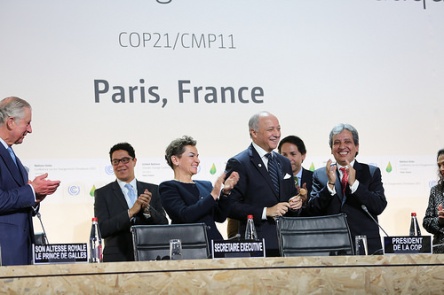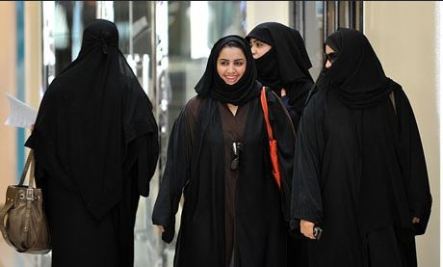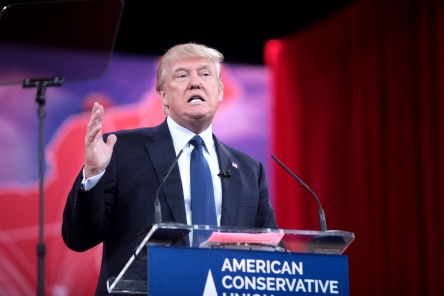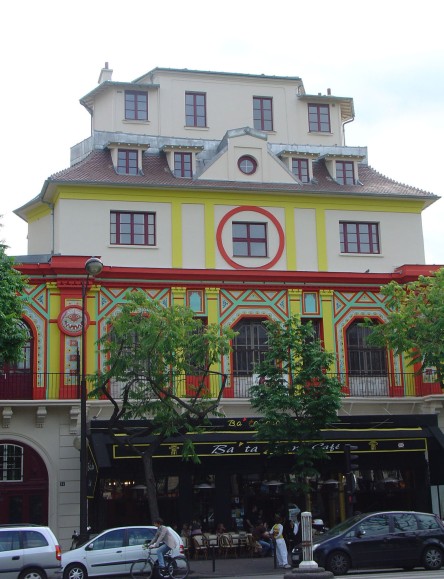By Katie Johns
- COP21 Climate Change Summit reaches deal to limit rise in global temperature

COP21 finally reached an agreement on climate change resolutions. Courtesy of Flickr.
On Saturday, nearly 200 countries reached a solution surrounding a global agreement on climate change. The goal of the environmental agreement is to reduce human-made greenhouse gas emissions. “A deal to attempt to limit the rise in global temperatures to less than 2C has been agreed at the climate change summit in Paris after two weeks of negotiations,” according to BBC reporting.
This is the first time all countries involved have joined the pact to cut carbon emissions, which is both partly voluntary and partly legally binding. The measures in the final draft include:
- Cap greenhouse gas emissions as soon as possible
- Reach a balance between sources and sinks of greenhouse gases
- Review progress every five years
- Keep global temperature increase below 2C [ 3.6F]
- Budget $100 million per year in climate finance for developing countries.
This is not the first time a deal has been attempted. In 2009, talks of a climate agreement failed in Copenhagen. Some say the rumor of imposing emission targets on countries was one of the reasons the deal failed. The latest negotiations avoid this regulation.
- Saudi women to legally vote for the first time

Saudi women walking in the Faysali shopping center. Some women have expressed still having barriers to voting and registering as candidates for political office. Courtesy of Flickr.
979 women candidates and 130,673 women voters registered for the Saudi Arabian municipal elections for the first time on December 12. In addition to being able to vote, women were also allowed to run for office in the nation’s elections. Some of these first-time voters reported a lack of registration centers and difficulties proving identities and residency, according to Human Rights Watch. Female candidates were also prohibited from talking with male voters and had to segregate in campaign offices. The elections will fill roles on local offices, which mostly oversee planning and development issues. 5,938 men ran for election and more than 1.3 million men registered to vote.
Officials first proposed the right for women to vote in 2005, and in 2011, King Abdullah issued a decree saying women would be allowed to vote and register as candidates in the municipal elections. In 2013, he demanded that 20 percent of the seats in the Consultative Council be reserved for women, CNN reports.
- Donald Trump calls to end Muslim immigration to the U.S.

Donald Trump speaking at the 2015 Conservative Political Action Conference earlier this year in Maryland. Courtesy of Wikimedia.
On Monday, Republican presidential candidate Donald Trump released a statement denouncing the admission of Muslim immigrants into the U.S.
He called for “total and complete shutdown of Muslims entering the United States until our country’s representatives can figure out what is going on,” The Atlantic reported. This statement comes shortly after President Obama’s plea for the nation to “reject discrimination” against Muslims. Trump’s proposal angered many, including fellow Republicans. Jeb Bush tweeted about Trump becoming “unhinged,” and Ted Cruz followed with a milder retort, simply saying that he did not share the same ideals as Trump.
Although he is not the only GOP candidate calling for Muslim immigration restrictions, he poses the most extreme limits. Both Cruz and Bush have suggested allowing only Christian refugees enter the U.S. Trump also stated that anyone belonging to the Muslim community should be considered a potential threat. The proposed ban would apply to more than just immigrants. Tourists and business travelers would be banned from the U.S. as well as Muslim-American citizens traveling out of the country who are trying to return home, Time reported.
- Third Paris attacker identified

The Bataclan theater in Paris was the site of terrorist shootings in November. The third attacker was identified this week. Courtesy of Wikimedia.
This past week, authorities identified the third attacker of the Bataclan and Paris shootings. On Nov. 13, 2015, 90 people died during the attacks in the Bataclan in Paris, and the death toll rose to 130 as the attacks moved to the streets of the City of Lights. Previously, two attackers had been identified: Omar Ismail Mostefai, 29, and Samy Amimour, 28. Foued Mohamed Aggad, a 23-year-old man from Strasbourg, France, and a French army reject, was identified as one of the attackers through DNA testing. About two weeks ago, Aggad’s mother received an English text message saying that her son died as a martyr on Nov. 13, which a common way for ISIS to notify families of casualties. After receiving the text, she gave police a DNA sample, which showed that one of her sons was killed in the Bataclan. According to reporting from The Guardian, Aggad went to Syria with his brother and friends at the end of 2013. Most of Aggad’s friends and his brother, Karim, were arrested three months after their return to France. Two members of the group were killed. All three attackers involved in the November Paris attacks were killed, two by suicide vests and one by the police.
- At least 34 dead in Burundi capital following military attacks

A map of Burundi, an African country under much political tension. Recently, attacks have taken to the streets of the country’s capital, Bujumbura. Courtesy of Wikimedia.
At least 34 people were killed in Burundi overnight Friday. Most of the deceased bodies were found lain out in of the country’s capital, Bujumbura, after militia stormed the area with guns. Residents are accusing police of taking revenge after military sites were attacked Friday, killing at least 87 people, eight of whom were security forces. “Unrest has plagued Burundi since an attempted coup in May and protests over the president’s continued rule,” according to BBC reporting.
Police spokespeople say the victims killed were behind the attacks on government installations. Since April, at least 240 people have been killed, and 200,00 have fled to neighboring countries. Some are concerned that this violence is stirring a return of the violence seen during the Hutus and Tutsis tension. The catalyst of the protests began in April when President Pierre Nkurunziza announced his campaign for a third term in office.